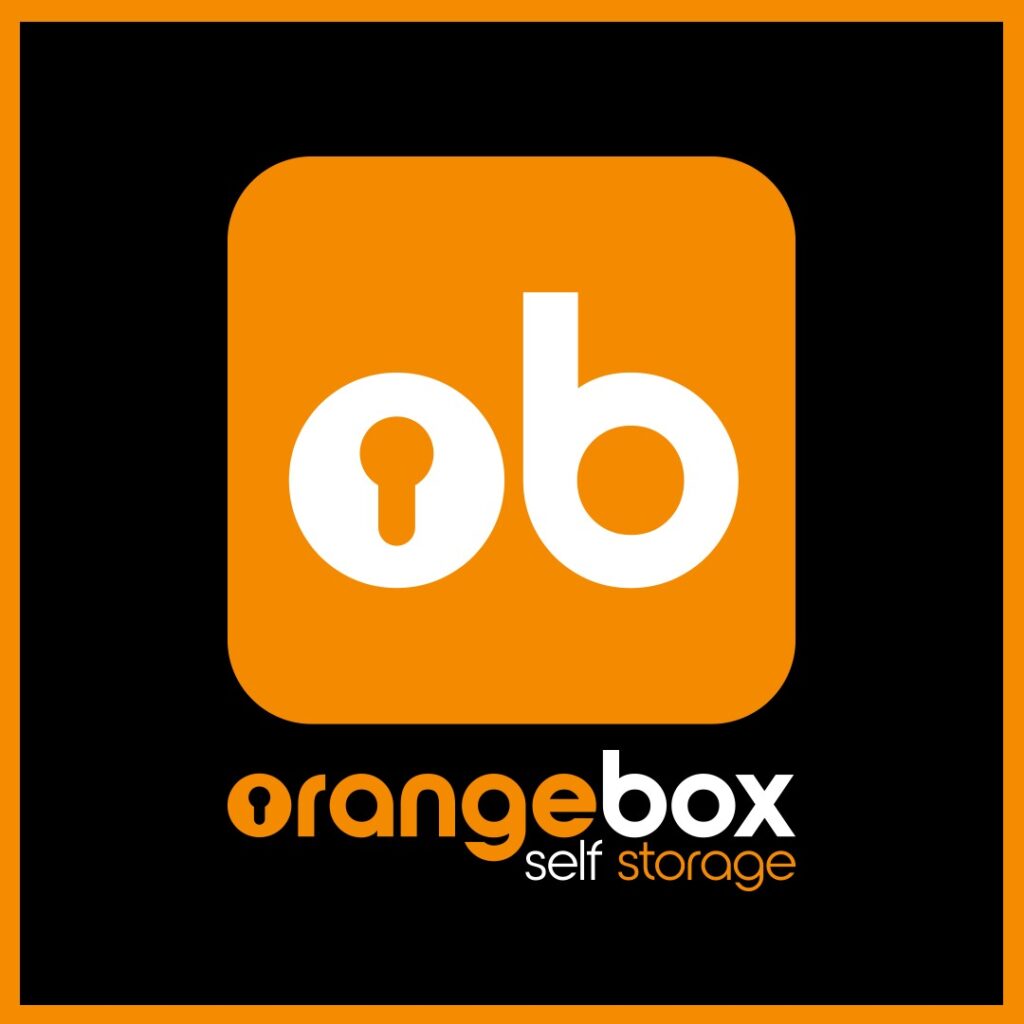Staring at a mountain of belongings between terms? It’s a classic student dilemma. Using storage units for students has quickly become a must-have for modern university life. It’s a straightforward, secure way to handle your stuff during holidays, a year abroad, or that awkward gap between moving out of halls and into a private let.
Why Smart Students Use Storage Units
The end of a university term often brings a familiar sense of dread. All the excitement of heading home for the summer gets quickly overshadowed by one massive logistical headache: what on earth do you do with all your stuff? For years, the only real option was to cram everything into a parent's car for a stressful trip home, only to haul it all back a few months later.
That chaotic cycle is exactly why dedicated storage units for students have become so popular. Just think of a storage unit as your own personal, off-campus locker. It’s a secure, accessible space that frees you from the burden of moving non-essentials like winter clothes, textbooks, kitchen gadgets, and even furniture back and forth.
"Clutter in my dorm became clutter in my brain. My storage unit gave me space to think.” This is something we hear all the time. It shows that self-storage is more than just a convenience; it's a way to cut down on stress and create some much-needed mental breathing room during those hectic academic transitions.
Key Scenarios Where Storage Is a Lifesaver
The need for student storage isn't just about the long summer break. There are several situations where renting a unit is a genuinely smart and practical move:
- Moving Between Accommodations: If there's a gap between your old tenancy ending and your new one starting, a storage unit provides a secure holding space for all your belongings. No more sleeping on a friend's floor surrounded by boxes.
- Studying Abroad: Taking a semester or a full year abroad is an incredible opportunity. A storage unit keeps your possessions safe and sound back in the UK, ready and waiting for your return.
- Downsizing or Upsizing: Moving from a spacious hall of residence to a smaller shared house? You can store items that won't fit, rather than being forced to sell or throw them away.
- Securing Valuables: Laptops, bikes, and other expensive items are far safer in a secure facility with CCTV than left in an empty student house over the holidays. You can find a range of student storage solutions in Nottingham that are secure, affordable, and flexible to see how they tick these boxes.
This rising demand isn't just a local trend. The student storage market is booming worldwide, with projections suggesting its value could hit $1.1 billion USD by 2033, growing at a rate of about 8% annually. This growth is fuelled by an increasing student population and the specialised services—like flexible contracts and easy online booking—that modern facilities now offer. You can find more details in this global student storage market report. It all goes to show that students everywhere are realising the immense value and peace of mind that a simple storage unit can provide.
Choosing the Right Storage Unit Size
One of the biggest mistakes students make when renting storage is paying for space they just don’t need. It’s easy to get lost staring at a list of dimensions like '15 sq ft' or '35 sq ft'. But picking the right size is the key to getting good value, and it’s much simpler than it seems once you translate those numbers into real-world objects.
Think of it like choosing a suitcase for a holiday. You wouldn’t drag a massive trunk along for a weekend trip, nor would you try to cram two weeks of clothes into a tiny carry-on. The same logic applies here; the goal is to find a snug fit for your stuff without wasting money on empty air.
Student Storage Unit Size Guide
To help you visualise what you actually need and avoid overspending, we've broken down the most common unit sizes. Instead of getting bogged down by square footage, picture these familiar spaces.
| Unit Size (sq ft) | Equivalent To | What It Typically Holds | Ideal For |
|---|---|---|---|
| 10-15 sq ft | A tall wardrobe or phone box | Several boxes of books/clothes, a backpack, a guitar, and a small desk lamp. | The essentials you don’t want to drag home; perfect for minimalists. |
| 25 sq ft | A small garden shed | The entire contents of a typical dorm room: single mattress, desk, chair, mini-fridge, multiple boxes, and a bicycle. | The most popular and cost-effective choice for the average student. |
| 35-50 sq ft | The back of a small transit van | A double bed, a small sofa, a dining table, and numerous boxes. | Sharing with a friend or storing the contents of a small studio flat. |
Remember, these are just estimates. If you’re ever in doubt, it’s a good idea to check out a detailed storage unit size guide to get a better feel for all the available options and how they match up with your belongings.
The image below shows how different factors, including unit size, play a big part in the overall cost.
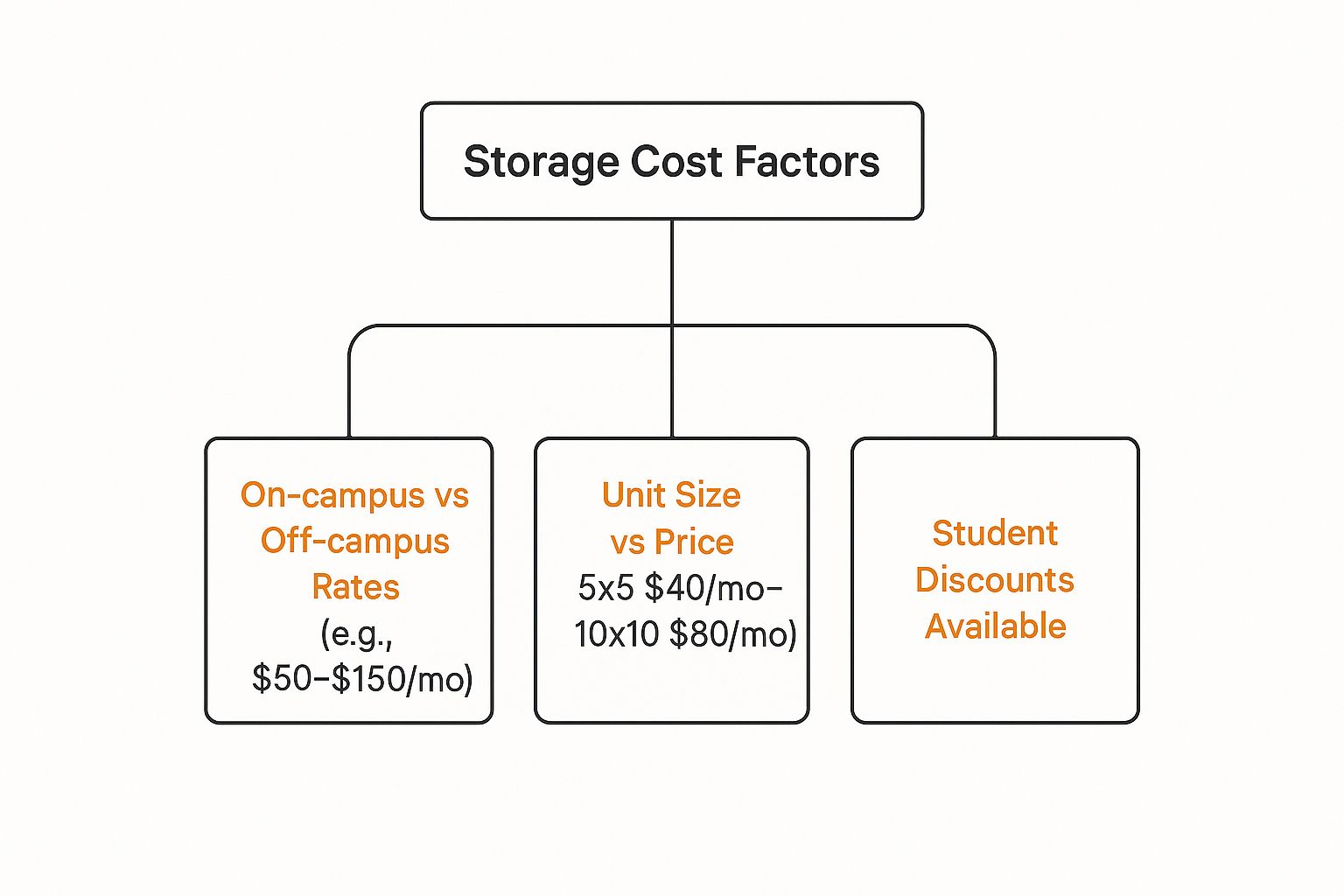
As you can see, the price jump between a small and a medium unit can be pretty significant, which is exactly why getting the size right is so important, especially when you’re on a student budget.
A Practical Inventory Checklist
Before you make a decision, take a few minutes to do a quick inventory of what you actually plan to store. This simple step can save you a ton of guesswork and cash. Just grab a notepad or use your phone and list everything out.
Try grouping your items into a few categories:
- Large Furniture: Bed frame, mattress, desk, chair, bookshelf.
- Electronics: TV, computer monitor, printer, speakers.
- Appliances: Mini-fridge, microwave, kettle.
- Boxes: A rough estimate of how many you'll need for clothes, books, kitchenware, and other bits and bobs.
- Oddly-Shaped Items: Your bicycle, a floor lamp, sports gear, or musical instruments.
Once you have this list, you can match it to the descriptions in the table with much more confidence. Many storage websites even have visual size calculators that will give you a recommendation based on what you’ve listed.
A great rule of thumb is to pick a unit that seems just a little smaller than you think you need. With some smart packing—like taking furniture apart and stacking boxes high—most students find they can fit everything into a more compact and budget-friendly space.
Ultimately, spending just ten minutes assessing your belongings will give you the confidence to book the perfect unit. You'll sidestep the frustration of a unit that’s too small and the needless expense of one that’s way too big.
Essential Features for Secure Student Storage
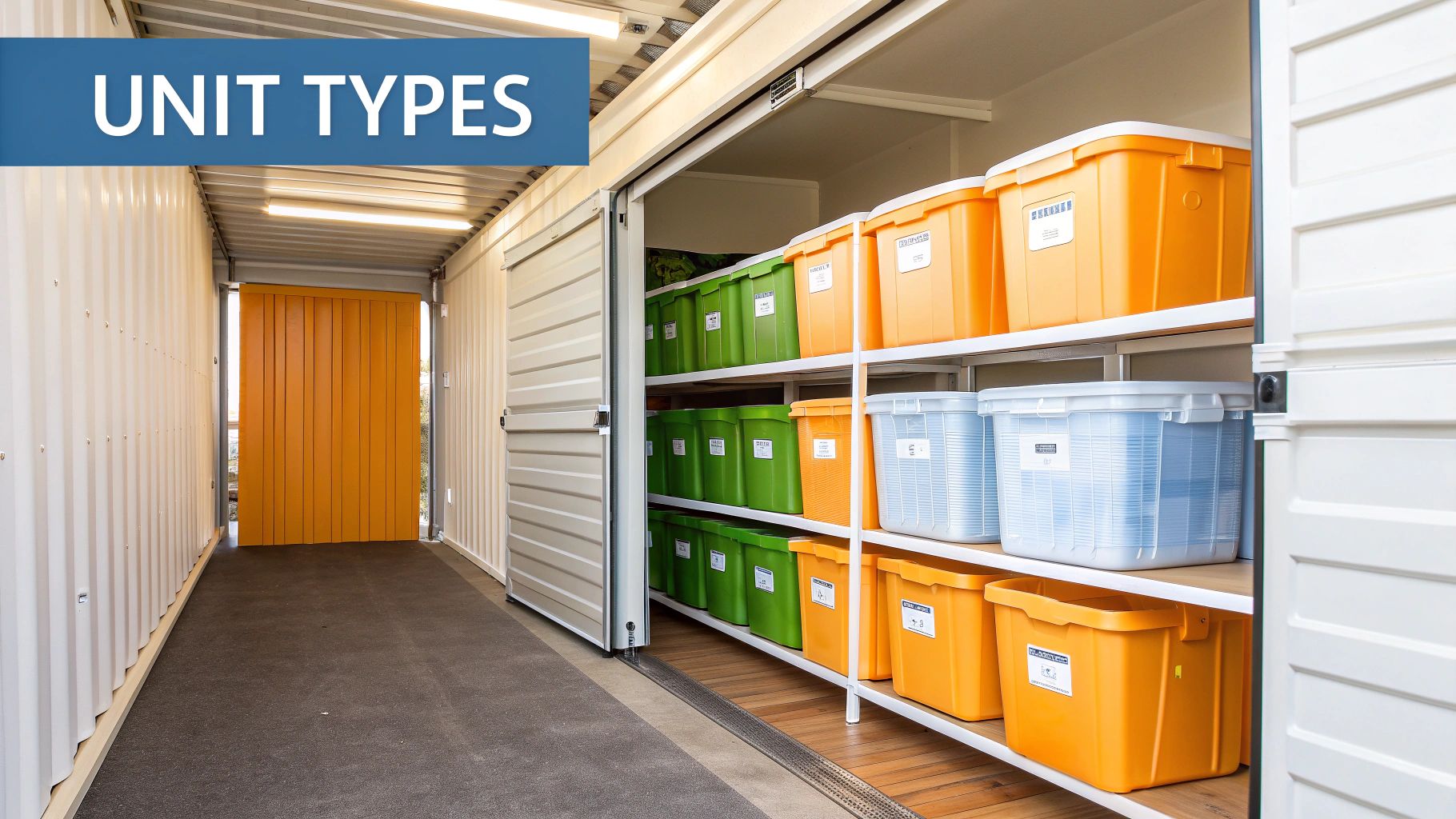
When you lock up your belongings, you’re doing more than just stashing boxes. You're trusting a facility to safeguard your essentials—from your expensive laptop and textbooks to sentimental items that are simply irreplaceable. Choosing the right storage units for students means looking beyond the price tag and focusing on what truly keeps your possessions secure.
It’s easy to get drawn in by the cheapest option, but those facilities often cut corners on the very features that give you genuine peace of mind. A simple padlock on a door just doesn’t cut it anymore. Modern security is all about layers, creating a robust defence that stops potential issues before they even start.
Think of it like securing your student house. You wouldn't rely on a single flimsy lock on the front door; you'd want strong locks, maybe a burglar alarm, and good lighting. The same principle applies to your storage unit.
The Non-Negotiables of Physical Security
The first layer of protection is the facility's physical infrastructure. These are the foundational security measures you should expect as an absolute minimum. When you visit a site or browse online, keep an eye out for these features:
- 24/7 CCTV Monitoring: High-definition cameras should cover all key areas, including entrances, exits, corridors, and loading bays. It’s not just about recording what happens; visible cameras are a powerful deterrent.
- Secure Perimeter Fencing: A well-maintained fence around the entire property is the first line of defence, controlling who can even get close to the buildings.
- Controlled Gate Access: You should need a unique PIN code or a digital key fob to get in. This creates a digital trail, logging everyone who comes and goes.
- Well-Lit Premises: Dark, shadowy corners are an invitation for trouble. A facility that is brightly lit at all hours feels safer and makes it tough for anyone to go unnoticed.
A key question to ask the manager is: "Is the CCTV monitored live, or is it just recorded?" While any recording is good, actively monitored systems often mean a faster response to any suspicious activity, giving you a higher level of protection.
Climate Control: A Must for Protecting Valuables
Security isn’t just about preventing theft; it's also about protecting your items from environmental damage. In the famously damp UK climate, a standard, unheated unit can become a breeding ground for mould and mildew, which can completely ruin your things.
This is where climate-controlled storage becomes essential. These units keep the temperature and humidity at a consistent level, protecting your sensitive items from damage.
Thinking of storing any of these? Climate control is non-negotiable:
- Electronics: Laptops, printers, speakers, and TVs can be fried by moisture and extreme temperature swings.
- Wooden Furniture: Wood can warp, crack, or swell in humid conditions.
- Important Documents and Books: Paper loves to absorb moisture, which leads to yellowing, mildew, and irreversible damage.
- Musical Instruments: Guitars, violins, and other instruments are incredibly sensitive to environmental changes.
The UK self storage market is growing fast, with a 7.2% increase in available space expected by 2025. A huge part of this growth is down to tech, as 68% of facilities now use advanced systems to improve their operations—including top-notch climate monitoring and security. You can find more details in this insightful UK self storage industry report for 2025.
Choosing the right features is a big part of the battle, but it's also important to avoid common slip-ups. To make sure you're fully prepared, check out our guide on the 8 common storage unit mistakes and how to avoid them. It’ll help you sidestep errors that could put your items at risk. By arming yourself with this knowledge, you can confidently choose a facility that offers complete protection.
How to Find Affordable Student Storage Deals
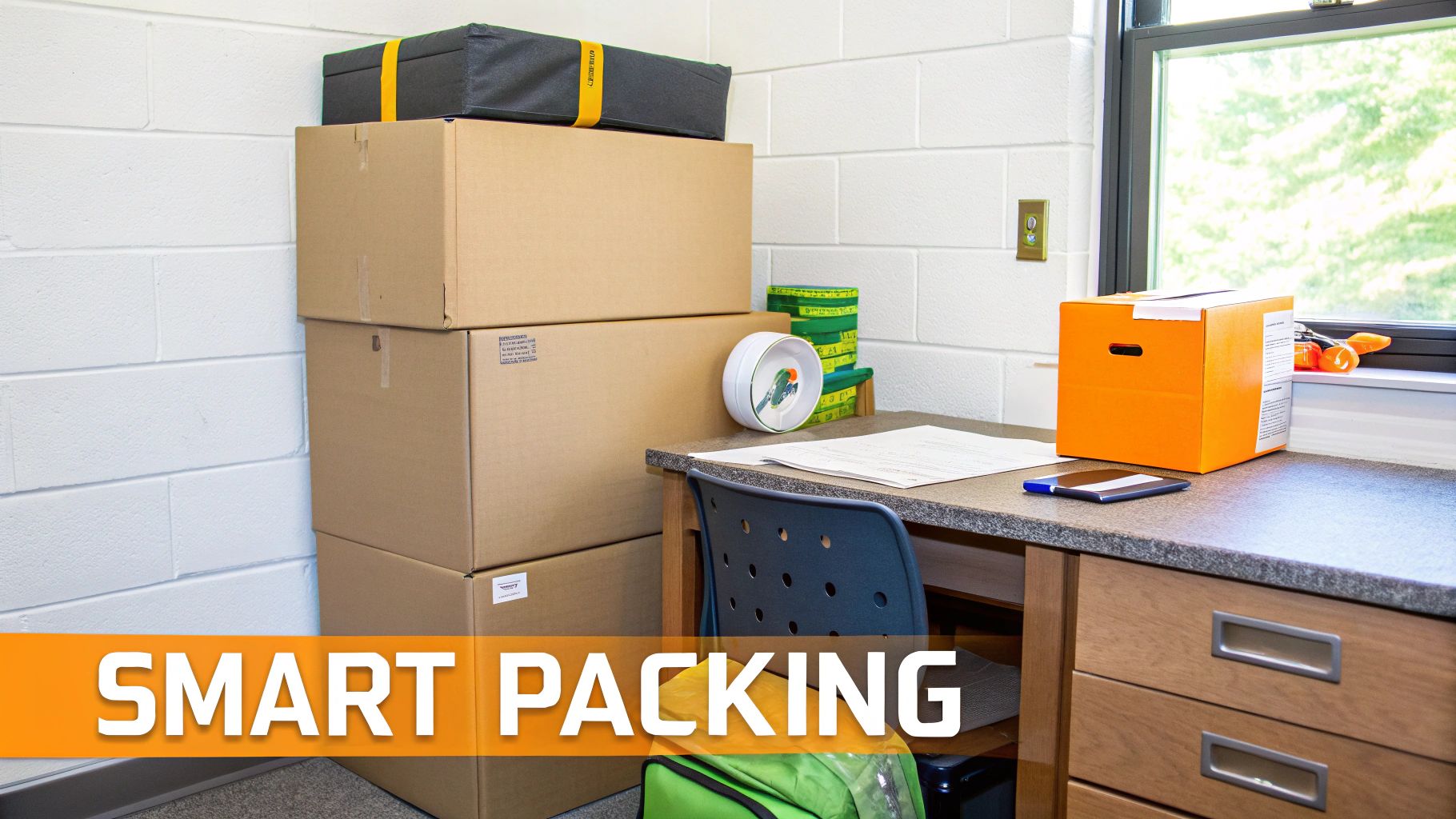
Let's be honest, the student budget is a real thing. It dictates pretty much every choice you make, from your weekly shop to a night out with mates. Finding a high-quality, secure place to stash your stuff over the holidays shouldn't mean you have to live on instant noodles for a month. The good news? It doesn't.
With a bit of smart planning, you can easily find storage units for students that won’t break the bank. It just means you have to be a savvy shopper and know where to look for the best value. A little effort here goes a long way, freeing up cash for more important things, like next term's textbooks.
Unlock Exclusive Student Discounts
Many storage facilities, especially those near university campuses, are keen to attract students. The most straightforward way to save is to simply ask if they offer a student discount. You’ll probably need to flash a valid student ID card, but that one simple question can often knock a decent chunk off your monthly bill.
These deals are so common because facilities know students are a massive part of their customer base. In fact, research shows that millennials and Gen Z make up about 54.4% of all self storage renters in the UK. They often go for smaller, budget-friendly units between 25 and 50 square feet, which can cost anywhere from £25 to £100 per month. It just goes to show that affordable options are definitely out there.
Don’t just stop at asking about a "student discount." Dig a little deeper. Ask about other promotions like "first month free" offers or deals on packing supplies. These can add up to some serious savings.
The Early Bird Gets the Best Deal
Timing is everything. As soon as the end-of-term countdown begins, the demand for storage units skyrockets. It's just like booking a flight—the closer you get to your departure date, the higher the prices climb as availability disappears. To sidestep the summer rush and lock in a better rate, start your search and book your unit at least four to six weeks before you plan to move out.
Booking early doesn’t just save you money; it also ensures you get the right-sized unit. Leave it to the last minute, and you might be stuck choosing between a unit that’s way too big (and expensive) or one that’s too small to fit your belongings.
Watch Out for Hidden Costs
A super-low introductory price looks great on the surface, but it's vital to get the full picture before you sign on the dotted line. Some quotes might not include everything, so it pays to ask about potential extra fees to avoid any nasty surprises on your first bill.
Always get clarity on these points:
- Security Deposit: Do I need to pay a refundable deposit upfront?
- Insurance: Most facilities require insurance. See if your parents' home policy covers items in storage, or if you'll need to buy a separate policy from the facility.
- Lock: Will you need to bring your own padlock? Some places sell them on-site, but you might find a cheaper one at a local hardware shop.
- Admin Fees: Are there any sneaky one-off administration or setup fees?
Getting a full breakdown of the costs helps you compare different facilities apples-to-apples and find a genuinely affordable deal. For instance, our convenient student storage solutions in Derby are completely transparent with pricing to help you budget properly. Understanding the difference between a flashy introductory offer and the real long-term cost is the secret to getting the best value for your money.
Your Stress-Free Packing and Moving Checklist
Booking your unit is a great first step, but now for the real challenge: getting everything packed up and moved in one piece. It can feel like a mammoth task, but with a bit of a game plan, moving day can be surprisingly painless. Think of this checklist as your secret weapon for an organised, damage-free move.
A little prep work now will save you hours of head-scratching and frustration later. Let’s break it down into simple, manageable steps.
Before You Start Packing
Before you even think about touching a roll of packing tape, a bit of planning is crucial. This is the groundwork that makes the rest of the process so much easier. It's all about gathering your supplies and knowing what you're storing.
- Gather Your Supplies: You’ll need more than just a few old boxes from the corner shop. Get your hands on strong, uniformly sized boxes (they stack like a dream), proper packing tape, bubble wrap for fragile bits, and a few marker pens for labelling.
- Create an Inventory: Make a quick list of everything you plan to put into storage. It doesn't have to be a novel, but it’s a lifesaver for remembering what you've stored and absolutely essential if you ever need to make an insurance claim.
The Art of Smart Packing
How you pack your boxes makes a huge difference. It’s not just about protecting your stuff, but also about making the most of every inch of your unit. A well-packed unit saves you money and hassle. The aim is to create solid, stackable blocks.
-
Uniform Boxes are Key: Using boxes of the same size makes stacking them into stable, space-saving towers much, much easier. Ditch the flimsy supermarket boxes that are likely to collapse under the weight of a few books.
-
Label Absolutely Everything: On the top and at least one side of every single box, write a clear, simple description of what’s inside. Think "Kitchen – Kettle & Mugs," "Second-Year Textbooks," or "Winter Coats." You’ll thank yourself later when you need to find something specific.
-
Protect Fragile Items: Wrap breakables like plates, glasses, and electronics individually in bubble wrap or packing paper. Place them right in the centre of the box, cushioned by softer items like towels or bedding.
-
Dismantle Furniture: To free up a massive amount of space, take apart bigger items like bed frames, desks, and bookshelves. Pop all the screws and small parts into a labelled plastic bag and tape it securely to the largest piece of that furniture.
A classic rookie mistake is making boxes way too heavy. A simple rule of thumb: fill large boxes with light, bulky things like duvets and cushions, and use smaller boxes for heavy stuff like books. Your back will thank you, and the boxes won't give way.
Loading Your Storage Unit Like a Pro
Right, you've made it to the facility. Don't just start chucking things in randomly. A bit of strategy here will protect your belongings and make it ten times easier to get to them when you come back.
Start by placing your largest and heaviest items at the back of the unit—things like your dismantled furniture and any appliances. Stand items like mattresses and sofas on their ends along the walls to save precious floor space.
Next, build a solid wall with your heaviest boxes, placing them on top of and around the furniture. As you work your way to the front, keep stacking with the heaviest at the bottom and the lightest on top. If your unit is big enough, try to leave a small walkway down the centre so you can actually get to the things at the back without a full-scale excavation.
Finally, put the items you’ll most likely need first right at the front, by the door. This could be your essential textbooks for the new term, your kettle, or a box of seasonal clothes.
As you gear up for a stress-free move, don't forget that a smooth departure also means leaving your old place spotless. A good end of tenancy cleaning checklist can be incredibly helpful for making sure you get your full deposit back. By following this moving playbook, you’ll find that using storage units for students is a simple and effective solution to a common headache.
What You Should Never Keep in a Storage Unit
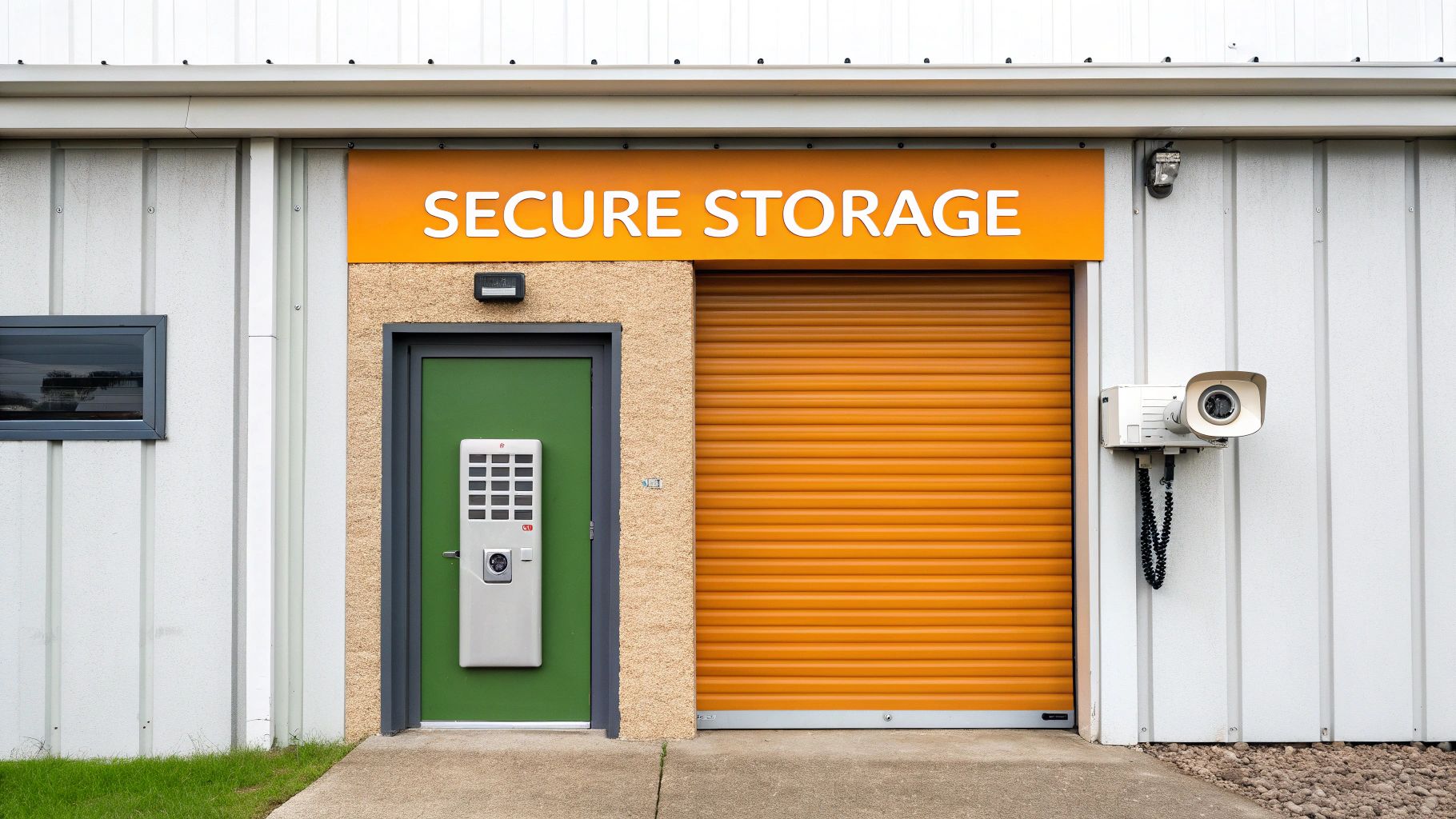
While a storage unit gives you amazing flexibility for sorting out your student life, it’s not a magic box where absolutely anything goes. For your own safety and to make sure you don’t break your rental agreement, there are some pretty strict rules about what you can and can’t store. Getting to grips with these is key to protecting your stuff, your deposit, and the entire facility.
Think of it like this: a storage facility is a shared space. What you decide to put in your unit can have a knock-on effect on everyone else’s. A leaky can of paint or a forgotten bag of crisps could cause widespread damage, attract pests, or even create a serious safety hazard.
Following the rules isn’t just about ticking boxes; it’s about being a good neighbour. Reputable facilities have these policies to guarantee a clean, secure, and safe environment for everyone.
The No-Go List
To keep it simple, every facility has a list of prohibited items. Storing any of these is a fast track to getting your contract cancelled and possibly facing fines.
- Hazardous Materials: This is the big one. Things like petrol, paint, fireworks, fertilisers, chemicals, and compressed gas canisters are completely banned. They are highly flammable or corrosive and pose a massive fire risk.
- Perishable Food: Never, ever store food of any kind. That includes tinned goods, dry pasta, or anything else that can spoil. It’s basically sending out an open invitation to pests like rodents and insects, which can infest an entire facility in no time.
- Living Things: This one might sound like a no-brainer, but it has to be said. You absolutely cannot keep animals or plants in a storage unit. It’s inhumane, illegal, and will lead to serious trouble.
- Illegal or Stolen Goods: Storage units are not for hiding illegal substances, unregistered firearms, or any stolen property. Facilities work closely with the police, and any dodgy activity will be reported straight away.
Items to Think Twice About Storing
Beyond the strictly forbidden list, there are some items that, while technically allowed, are just a bad idea to keep in a storage unit. This is less about rules and more about common sense and protecting what’s truly important to you.
Storing something with huge monetary or sentimental value is always a bit of a gamble. While facilities offer great security, they aren’t personal bank vaults. Your most precious belongings are always safest when they’re with you.
You’re better off finding another home for these:
- Irreplaceable Sentimental Items: We’re talking about old family photos, one-of-a-kind heirlooms, or treasured letters. If losing it would be absolutely heartbreaking, don’t store it away.
- Crucial Documents: Your passport, birth certificate, university degree, and other vital paperwork should be kept in a secure spot at home, not in an off-site unit.
- High-Value Jewellery or Cash: Standard insurance policies for storage units often have pretty low limits on coverage for expensive items like these. A safety deposit box at a bank is a much safer bet.
Your Student Storage Questions Answered
Even with the best-laid plans, it’s completely normal to have a few last-minute questions before you commit to renting a storage unit. Getting those niggling doubts cleared up now means you won’t have to deal with any surprises later on.
Think of this as your final check-in. We’re tackling the most common queries we get from students, so you can book your space with total confidence and use it like a pro. A little bit of knowledge here can turn a potentially stressful task into a straightforward one.
Do I Need My Own Lock for the Unit?
Yes, in most cases, you’ll need to bring your own lock. This isn’t a drawback; it's a critical security feature. It means you, and only you, hold the key or combination to your unit. You’re in complete control.
Many facilities sell high-quality padlocks on-site, which is handy if you're short on time. However, you're always free to buy one yourself. A good, sturdy padlock is a small investment that buys a lot of peace of mind.
A strong, disc-style padlock is often recommended. They're much tougher to tamper with or cut than standard locks, adding an extra layer of security that’s well worth it.
Is Insurance Required for Student Storage?
Most reputable storage providers will require you to have some form of insurance for your belongings. It’s a standard practice that protects both you and the facility if something unexpected happens, like damage or loss.
Before you buy a policy directly from the storage company, it's a good idea to check your parents' home insurance. Some policies actually cover items kept in storage, which could save you a bit of cash. If not, the facility’s own insurance is usually affordable and very easy to set up.
Can I Access My Storage Unit at Any Time?
This is a crucial detail to nail down, as access hours can vary quite a bit from one facility to another. Some premium providers offer 24/7 access, which is perfect for students with unpredictable schedules who might need to grab something late at night or super early in the morning.
Other places might have set hours, for instance, from 6 am to 10 pm. Always double-check this before you sign anything. You need to be sure the access times work with your lifestyle so you’re not left stuck outside when you need your stuff. You can find all the details on our flexible student storage services and access times right on our website.
What Happens If I Need the Unit for Longer?
Flexibility is one of the biggest perks of using storage units for students. Most agreements are on a simple month-to-month basis. If your plans change—maybe you’re staying on for a summer job or your housing falls through—you can just keep paying the monthly rent for as long as you need it.
The key is communication. Just give the facility a heads-up. When you're finally ready to clear out, you’ll need to provide the required notice, which is usually between 7 and 14 days. This ensures a smooth, simple move-out without any surprise fees. It’s this kind of flexibility that makes student storage such a great fit for the unpredictability of uni life.
Ready to book your secure and affordable student storage? With Orange Box Self Storage, you get flexible contracts, a wide choice of unit sizes, and top-tier security features designed for students. Get your free quote and book your unit online today!


